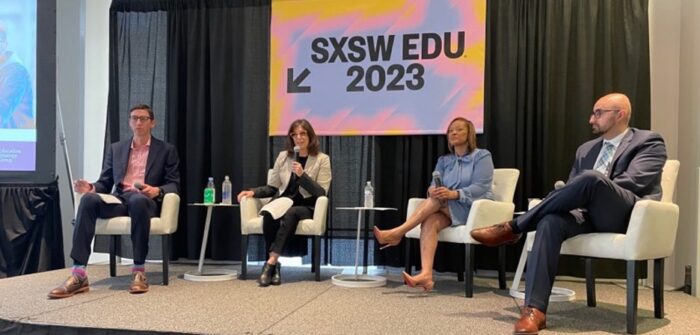What have we learned so far about accelerated pathways?
Colleagues,
Nothing inspires me more than traveling to different parts of the country and meeting with students who are excited about their education and their futures, and talking with the education and workforce leaders who work together to make those high-quality education pathways possible. That’s exactly what our Pathways team at the Gates Foundation had the opportunity to do during a recent visit to California to learn more about the pathways work across the state. At the end of our visit, one takeaway was clear: great work is happening in California and there is much to be learned about the policies and partnerships that are making it possible.
In fact, we are seeing many key components of high-quality pathways coming together in places like Oakland and in San Bernadino and Riverside counties; alignment of community resources, a push for systems change, a variety of learning options for students to choose from, and integration of policies and programs across K-12 and higher ed. In talking with K-12, postsecondary, employers, researchers, and intermediary leaders in these communities, it’s inspiring to hear them describe their vision and willingness to come together and do hard things in support of their students, including developing new and innovative approaches to integrating career-connected coursework, training, work-based learning experiences, and credential opportunities that create pathways to both college and career.
Our visit was also a reminder that progress doesn’t happen overnight – it can take years of policy development and partnership-building for the pieces of strong pathways programs to come together. For example, in Oakland we talked to partners about how it took more than a decade of getting policymakers, advocates, and practitioners together to develop pathways initiatives in a coherent and cohesive way and also to get the state funding in place for initiatives such as the Dual Enrollment and Golden State Pathways Program that help accelerate these programs.
We also spoke to students in Oakland High School’s dual enrollment program who said the program 1) provides a good way to see what it means to be in a college environment, 2) enables them to continue their education while taking on less debt, and 3) gives them a sense of ownership of both their education and also their future careers. Their motivation and engagement was exciting to see, and it’s no surprise that the school’s dual enrollment students are more likely to enroll in postsecondary opportunities after graduation. The work has also helped create a college-going culture across the school. Since 2015, the graduation rate has jumped from 70% to 87%!
It’s also promising to see leaders acknowledging that dual enrollment is not enough. We need accelerated, integrated postsecondary pathways that bring together key elements such as personalized college and career advising, stackable credits, aligned programs of study, work-based learning opportunities, and intentional social capital building that’s tied to student outcomes. Young people need a variety of learning options and personal support from the moment they begin their learning journey through career.
The work being done across California communities has me optimistic for the future. It’s a signal to the field of the momentum building to ensure that all learners, especially students who have been traditionally underserved, will receive the support they need to thrive at school, the workplace, and in their communities.
Sincerely,

Sara Allan
Director, Early Learning and Pathways, Gates Foundation
In this issue of Wayfinders: learn about the Accelerate ED panel at SXSW EDU on developing and scaling accelerated pathways. We also recap the Accelerate ED Lessons Learned report from the 12 cross-sector design teams across the country.
“Lessons Learned” from Accelerate ED – SXSW EDU and a New Report!

Accelerate ED took to the stage at SXSW EDU earlier this month, with Education Strategy Group (ESG) leading a panel discussion with funders and on-the-ground leaders discussing how they are developing and scaling accelerated pathways to postsecondary credentials in high-value fields – including via dual enrollment, early college high schools, and work-based learning.
Led by ESG principal and moderator Ryan Reyna, the discussion included perspectives from:
- Sara Allan, Director, Early Learning and Pathways, Gates Foundation
- Creslond Fannin, Executive Director of Early College High School & PTECH, Office of School Leadership, Austin Independent School District
- Juan Jose Gonzalez, Pathways Director, Education Systems Center, Northern Illinois University
Among the takeaways from the conversation were:
- Students find the most long-term success when dual enrollment is clearly articulated toward an industry-valued credential, and includes embedded advising, wrap-around support, and work-based learning.
- It is important to listen to students and families to co-design solutions to expand access and success in accelerated pathways to credentials.
- State policy and funding mechanisms can either hinder or catalyze these programs. It is important for state leaders to engage with local programs to identify opportunities for scale.
This event also served as the release of a suite of materials that capture the journeys and lessons learned from the 12 cross-sector design teams across the country. These include:
- Snapshot case studies of each design team’s model for accelerating students’ progress toward associate degrees while in high school
- A report detailing the major lessons learned from the 2022 Accelerate ED design sprint and other innovative efforts from across the country
- Additional resources for leaders who want to build out these offerings, including key policy, data, and community considerations
Check out these new resources and learn the essentials of how these programs are working to reach more students across the country.
What We Are Reading
- How Can Community Colleges Afford to Offer Dual Enrollment College Courses to High School Students at a Discount?
- How Governance Strengthens Pathways
- OneGoal: A Social Impact Solution Where Your Journey Can Become Your Genius
- Innovating High School Math through K-12 and Higher Education Partnerships



